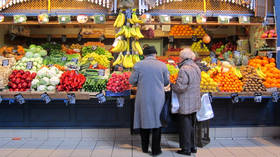EU country sees inflation smash 25%

Headline inflation in Hungary accelerated to an annual 25.7% in January compared to 24.5% the previous month, according to the latest data released by the Central Statistics Office (KSH) on Friday.
The surge is attributed to intense price pressures in an economy where the labor market remains tight.
The KSH clarified that the prices for energy, food and fuel saw the most growth over the past year, and that prices in January increased by 2.3% month-on-month.
Hungarian inflation is currently ranked the highest in central Europe. The country's central bank is keeping interest rates at the highest in the EU to support the national currency. The forint has strengthened substantially, boosted in part by a weaker dollar, and tight monetary policy.
In 2022, average inflation in Hungary accelerated to 14.5%, hitting a 25-year high. The Hungarian National Bank’s outlook showed in December that average inflation could be even higher in 2023, slowing more significantly only from the middle of the year.
Retail sales data released earlier this month demonstrated that inflation has severely hit purchasing power, with Hungarians reducing their spending in December.
Food prices soared 44% year-on-year in January, while household energy prices surged 52.4% after the government slashed utility bill subsidies in 2022. Fuel prices saw an increase of 35.9% after a supply shortage forced Budapest to drop the year-long price cap. Prices of consumer durables increased by 13.5%, while service prices rose 11.3%.
For more stories on economy & finance visit RT's business section












